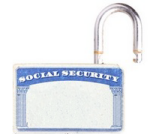In recent years, identity thieves have broadened their search for social security numbers by targeting minors. They are preying on kids under the age of 18 years old that have dormant social security numbers and have clean credit histories. Even more, many of the stolen numbers belong to children as young as 2 which allow thieves to get away with it for years.
 How do they do it?
How do they do it?
Thieves use a whole host of tactics to get their hands on your child’s identity, so being aware of some of their schemes can save you time and money, as well as all the headaches that come from clearing their name and credit report. You many not realize it, but your child’s social security number is required and stored with many schools, health care providers, banks and other institutions. Identity thieves work to hack these computer systems which can be fairly easy to do.
Unfortunately, you may only find out about it when either a collection agency begins asking for payments or years later your child’s student loan application is rejected.
One of the causes of the problem is uncontrollable
The social security number system was never actually designed or intended to be used so broadly as a form of identification. As a consequence, hackers and code breakers have developed certain algorithms that are designed to predict and identify social security numbers with some degree of success. Unfortunately, there isn’t much we can do about it since social security numbers are required to manage our daily lives and the government has yet to develop a new system.
How can I protect my child’s social security number?
It may seem wise to not register your child for a social security number but it’s needed to apply for medical coverage, to be claimed as a dependent for tax purposes, and to open a savings account in their name.
The most important thing is to guard your child’s personal and financial information. If a company or institution requires it, ask them important questions such as, “Why do you need it?” or “Do you accept another form of identification?” or “What security precautions do you take?” Bottom-line, make sure you know and trust the people and companies with which you share information. Also, shred documents before tossing them. Use complicated passwords (and different ones across accounts) when banking online, and make sure anything you purchase via the Internet is from a reputable company. And make sure to get a free credit report each year to double-check that nothing looks fishy. You can even set real-time credit alerts with one or more of the credit bureaus.
More personal finance questions? Browse answers or ask finance questions online.
Related Articles
->Protect My Bank Account After the Epsilon Data Breach
->Protecting Your Bank Account
->What You Need to Know When Checking Your Credit Score
->My Parents Credit Card Account is Hurting My Credit Score
->Should I Use a Debt Settlement Company Now?
->Should My Child Be an Authorized User on My Credit Card Account?


